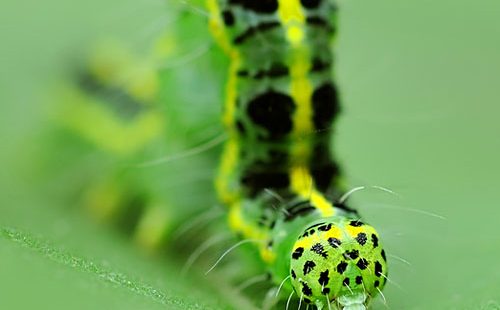Great insults pepper the comedies and tragedies of William Shakespeare. (Though the Bard of Avon is known for his terms of endearments as well.) From A Midsummer Night’s Dream to King Henry IV, here are a few of our favorites.
You canker blossom!
This flowery barb is delivered by the newly lovelorn Hermia in A Midsummer Night’s Dream after her beloved, Lysander, expresses his disinterest in her—a shift attributable to Puck’s mischievous interloping. Incensed at his change of heart, Hermia fires the following line at Lysander’s new object of affection, Helena: “O me! You juggler! You canker blossom! You thief of love!”
The earliest sense of the word canker was “something that corrodes, corrupts, destroys, or irritates.” Around the mid-1400s, people began using it in an extended sense to refer to a caterpillar or worm that attacks plants and preys on flower buds. Thus, when Hermia calls Helena a canker blossom, she is likening her to one of these pernicious creatures who destroys flowers, and by metaphorical extension, suggests that Helena is a creature who, as evidenced by her theft of Lysander’s love, destroys or corrupts beauty and goodness.
Mad mustachio purple-hued malt-worms
This colorful phrase comes from King Henry IV, Part 1. It’s delivered by the thieving Gadshill as he makes a case to the Chamberlain for the distinguished company he keeps: “I am joined with no foot land-rakers, no long-staff sixpenny strikers, none of these mad mustachio purple-hued malt-worms; but with nobility and tranquility…”
The word malt-worm appeared in English around the mid-1400s and it referred to a malt-infesting weevil or beetle. About a century later, the term began to be used for a different sort of malt infestation with a sense of “a heavy drinker; drunkard.” In the notes of a 18th-century edition of Henry IV, Samuel Johnson elaborates on the phrase as “those whose faces are red with drinking ale.” Other interpretations suggest that the phrase refers to men whose mustaches or upper-lips are perpetually stained from drinking. Whether the purple hue is by stain or by flush, we can thank the Bard for this inspired addition to the word family of tipplers, dipsomaniacs, and tosspots.
False caterpillars
Not to be outdone by lowly cankers and malt-worms, the caterpillar holds a spot in Shakespeare’s canon of insults as well. The messenger in Henry IV, Part 2 reports to King Henry that a rebel troop of “scholars, lawyers, courtiers, gentlemen” is approaching, a group that he derogatorily refers to as “false caterpillars.”
We know caterpillar to mean wormlike larva of a butterfly or moth; this sense has been in English since the mid-1400s. But shortly after this sense arose, people began using the term in a figurative sense to refer to a person who preys on others, or an extortioner. Although the messenger in Henry IV applies the expression “false caterpillars” to the whole lot of rebels, a look at the Bard’s phraseology around lawyers in his broad body of work suggests that this slight might be aimed more at the lawyers than the scholars and courtiers. In the words of linguist and Shakespeare scholar David Crystal, “According to the combined opinions of Rosalind, Jacques, Mercutio, Jack Cade, Hamlet, Timon, a Fool and a Servant, lawyers are politic, sleeping, false, avaricious, money-grabbing, empty-headed, frivolous, quibbling, philandering, death-deserving caterpillars.”
This pejorative usage of the word caterpillar lends credibility to a possible etymological connection to the word pill, an archaic term meaning “to rob, plunder, or pillage” which gave us piller, “one who plunders” and pillage, “to strip ruthlessly of money or goods by open violence, as in war; plunder.”
What are some of your favorite Shakespearean insults?












